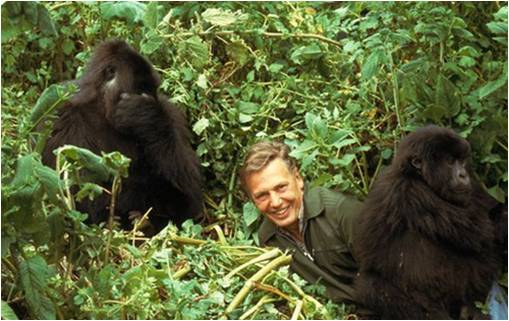Life on Earth
In order to obtain footage of rare and elusive animals, special filming techniques had to be devised. One cameraman
spent hundreds of hours waiting for the fleeting moment when a rare frog, which incubates its young in its mouth,
finally spat them out. Another built a replica of a mole rat burrow in a horizontally-mounted wheel, so that as the
mole rat ran along the tunnel, the wheel could be spun to keep the animal adjacent to the camera. To illustrate the
motion of bats' wings in flight, a slow motion sequence was filmed in a wind tunnel.
(from wikipedia.org)

Life on Earth: A Natural History by David Attenborough is a BBC nature documentary series about a study of the evolution of life on the planet. The series consists of thirteen episodes and begins with David Attenborough's opening narration:
"There are some four million different kinds of animals and plants in the world. Four million different solutions to the problems of staying alive. This is the story of how a few of them came to be as they are." The first episode is devoted to illustrating the diversity and origins of life on Earth.
And then through the next 12 episodes the series looks at the evolution of living creatures including the sea-living creatures, insects, amphibians, reptiles, birds, mammals, primates and humans.
Episode 01 - The Infinite Variety
This episode begins in the South American rainforest, whose rich variety of life forms is used to illustrate the sheer number of different species.
Episode 02 - Building Bodies
This episode explores the various sea-living invertebrates. In Morocco, the limestones are 600 million years old, and contain many invertebrate fossils.
Episode 03 - The First Forests
This episode examines the earliest land vegetation and insects. The first plants, being devoid of stems, mainly comprised mosses and liverworts.
Episode 04 - The Swarming Hordes
This episode details the relationship between flowers and insects. There are some one million classified species of insect, and two or three times as many that are yet to be labelled.
Episode 05 - The Conquest of the Waters
This episode looks at the evolution of fish. They have developed a multitude of shapes, sizes and methods of propulsion and navigation.
Episode 06 - Invasion of the Land
This episode describes the move from water to land. The fish that did so may have been forced to because of drought, or chose to in search of food.
Episode 07 - Victors of the Dry Land
This episode is devoted to the evolution of reptiles. They are not as restricted as their amphibian ancestors, since they can survive in the hottest climates.
Episode 08 - Lords of the Air
This episode focuses on birds. The feather is key to everything that is crucial about a bird: it is both its aerofoil and its insulator.
Episode 09 - The Rise of the Mammals
This episode is the first of several to concentrate on mammals. The platypus and the echidna are the only mammals that lay eggs (in much the same manner of reptiles).
Episode 10 - Theme and Variations
This episode continues the study of mammals, and particularly those whose young gestate inside their bodies.
Episode 11 - The Hunters and Hunted
This episode surveys mammal herbivores and their predators. The herbivores began to populate the forests when the dinosaurs disappeared, and many took to gathering food at night.
Episode 12 - Life in the Trees
This episode investigates the primates, whose defining characteristics are forward-facing eyes for judging distance, and gripping hands with which to grasp branches, manipulate food and groom one another.
Episode 13 - The Compulsive Communicators
This episode deals with the evolution of the most widespread and dominant species on Earth: humans.
| Related Links |
| Life on Earth (TV series) - wikipedia Life on Earth: A Natural History by David Attenborough is a television natural history series made by the BBC in association with Warner Bros. |
| Life This is a BBC nature documentary series narrated by David Attenborough, taking a global view of the specialized strategies and extreme behavior that living things have developed in order to survive. |
| Triumph of Life This is a six-part PBS documentary series narrated by Liev Schreiber, telling the story of evolution of life on Earth. |
| Journey of Life This is a five-part BBC documentary series hosted by Steve Leonard, taking us on a 4 billion year journey from the first spark of life to the conquering of a planet. |
| Australia's First 4 Billion Years This is a PBS NOVA documentary series hosted by Richard Smith, exploring the history of the planet as seen through the window of the Australian continent. |
| The Living Planet This is a BBC nature documentary series looking at the ways in which living organisms, including humans, adapt to their surroundings. |
| Planet Earth This is a BBC nature documentary series narrated by David Attenborough, looking at a global overview of different habitats on Earth. |
| Nature's Microworlds This is a BBC documentary series narrated by Steve Backshall, looking at some of the world's most iconic ecosystems. |
| A Perfect Planet This is a BBC documentary series presented by David Attenborough, looking at how the forces of nature drive and shape life on Earth. |